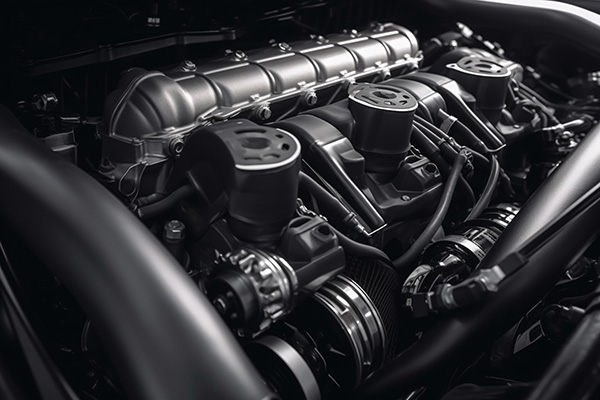
The team at Grand Garage will share a few facts and explain how the fuel injection system works and its main components. We will also cover maintenance to ensure a smooth and fuel-efficient drive.
How Does the Direct Fuel Injection System Work?
At the heart of your vehicle's power generation lies the combustion process within the engine cylinders. Unlike carbureted systems of the past, fuel injection systems operate with surgical precision, adapting to driving conditions and engine demands in real-time.
The process begins with sensors monitoring various factors like engine speed, load, and temperature. This data is relayed to the engine control unit (ECU), the brain of the vehicle. The ECU processes this information and calculates the optimal amount of fuel required for combustion.
Next, the fuel injectors come into play. Positioned near the intake valves, these precision-engineered nozzles spray a fine mist of fuel directly into the combustion chamber. The timing and duration of this injection are meticulously controlled by the ECU, ensuring the fuel mixes thoroughly with incoming air for an efficient and controlled burn.
Are There Other Types Of Injection Systems?
The conventional injection system is the other type of fuel injection. Most vehicles use it because of its robustness.
As we just said, it is popular; some might even say that it's "the most" popular, and it works by adding fuel into the engine before it's burned. This helps to make sure that the fuel and air mix together properly, which is really important for making the car run well. The engine control unit helps to make sure that everything is timed perfectly, so the fuel is added at just the right moment - everything has to be just right to make sure the car runs properly.
Which Is Better?
Both function very similarly and share the same components, with the exception of a few small details. As a whole, most people consider the conventional fuel injection system to be a better option when compared to direct injection. Each has its own advantages, but here are five reasons people prefer the conventional route:
- Proven reliability
- Simplicity and cost-effectiveness
- Combustion chamber cooling
- Reduced carbon buildup
- Compatibility with lower-quality fuels
Main Components of the Fuel Injection System
Fuel Injectors
These nozzles atomize the fuel into a fine spray, facilitating efficient combustion.
Fuel Pump
The fuel pump ensures a consistent flow of fuel from the tank to the injectors, maintaining optimal pressure.
Fuel Pressure Regulator
This component regulates the fuel pressure in the system, ensuring a balanced and controlled flow.
Engine Control Unit (ECU)
The ECU processes data from sensors and adjusts the fuel injection parameters to optimize engine performance.
Sensors
Various sensors, including the oxygen sensor, throttle position sensor, and mass airflow sensor, provide real-time data to the ECU for precise fuel delivery.
How Can I Maintain The Fuel Injection System?
Ensuring the longevity and efficiency of your fuel injection system requires proactive maintenance. Before we share a few ways to keep it working perfectly, the team at Grand Garage is more than ready to take care of your fuel injection system and vehicle in general!
Here's how you can keep this vital system in optimal condition:
Regular Fuel System Cleaning
Over time, deposits can accumulate on the fuel injectors, affecting their efficiency. Periodic fuel system cleaning helps remove these deposits, ensuring a consistent spray pattern.
Air Filter Replacement
A clogged air filter can disrupt the balance between air and fuel. Regular air filter replacements contribute to optimal combustion and fuel efficiency.
Fuel Filter Replacement
The fuel filter prevents contaminants from reaching the injectors. Regular replacement ensures a clean fuel supply and prevents clogs.
Oxygen Sensor Inspection
The oxygen sensor monitors exhaust gasses and contributes to the ECU's fuel adjustments. Regular inspection and replacement as needed maintain accurate sensor readings.
Throttle Body Cleaning
The throttle body regulates the airflow into the engine. Periodic cleaning prevents carbon buildup, ensuring smooth operation and precise fuel delivery.
FAQ Section!
Q1: What happens if I neglect to clean my fuel injection system?
A: Neglecting fuel system cleaning can lead to injector clogs, affecting fuel spray patterns and reducing combustion efficiency, potentially impacting engine performance.
Q2: Is the throttle body cleaning necessary for fuel injection system maintenance?
A: Yes, cleaning the throttle body is essential. Carbon buildup can disrupt airflow, affecting the precise regulation of fuel injection and leading to performance issues.
Q3: Is the conventional fuel injection system still relevant in modern vehicles?
Absolutely! While advanced technologies like direct fuel injection have gained prominence, the conventional system continues to offer distinct advantages. Its inherent simplicity and cost-effectiveness make it an attractive option
Q4: Are there specific signs that indicate a failing oxygen sensor in the fuel injection system?
A: Yes, signs include decreased fuel efficiency, rough idling, and increased emissions. A failing oxygen sensor can disrupt the system's ability to adjust fuel delivery accurately.
Q5: Can a clogged fuel filter impact the fuel injection system's performance?
A: Absolutely. A clogged fuel filter restricts fuel flow, leading to poor fuel delivery and potentially damaging the injectors over time.
For expert vehicle care and repairs, contact Grand Garage! Our team will get you scheduled for an appointment, so you can leave the rest to us!